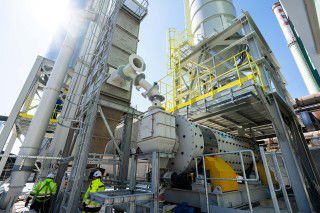This week, BUA Cement completed its NGN115bn (US$291bn) Series 1 corporate bond issue. The company is set on an expansion programme that will result in its production capacity reaching 22Mta by 2022 with three new production units established in Edo, Sokoto and Adamawa states, adding 9Mta to group cement capacity.
BUA Cement sees a good opportunity to grow further in its domestic market of Nigeria, despite the presence of Dangote Cement, which has an installed capacity of 29.3Mta in Nigeria, and LafargeHolcim's 10.5Mta of production capacity. BUA Cement estimates that per capita consumption remains relatively low in African terms at 109kg, as reported in ICR January 2021.
Samad Rabiu, chairman of BUA Cement, said: "Nigeria and the surrounding region are homes to huge opportunities in construction, housing, infrastructure and allied industries.
"Despite these opportunities, there is no doubt that there is still a huge deficit in supply while demand continues to increase. This situation has led to an increase in retail prices of cement despite ex-factory prices remaining partially unchanged."
BUA Cement is making a significant investment in enlisting the assistance of Sinoma CBMI to build three new plants at a cost of US$1.05bn. The projects will push Nigeria's cement capacity up to 60Mta by 2022 from around 51.1Mta today.
Cement supply shortage
The new capacity will be viewed eagerly in several parts of Nigeria where the price of cement quickly rose at the end of 2020 due to a domestic supply shortage. Cement prices have risen by as much as 60 per cent in recent weeks due to a combination of supply disruptions, higher domestic freight costs and higher export volumes.
In the 4Q20 Nigerian cement was sold for between NGN2400-2500 in many states, reports The Guardian. Cement prices have moved on significantly. In January 2021 with a 50kg bag of cement now fetching prices of NGN3600 in Lagos, NGN4000 in Enugu and Imo states, NGN4300 in Cross River state NGN3200 in Abuja and NGN3500 in Kano and Oyo states.
Distributors have hinted that the increase of ex-factory prices are a result of the economic situation of more supplies being sent across the borders. The federal government has authorised both Dangote Cement and BUA Cement to transport cement over the border to neighbouring countries that command higher prices. Niger, Cameroon and Chad are targets for Nigerian exports and northern Nigeria has also seen increased cement demand.
Other reasons for the cement shortage have been given as machine breakdown and an industrial strike by cement truck drivers for improved welfare. Dangote Cement also increased its ex-factory price to NGN3050 (US$8), due to logistics and production costs. Dangote Cement have blamed the shortage on electricity tariffs and the pump price of fuel.
Supply has been under pressure in some regions such as Kano, where cement production is said to have dropped drastically, according to The Guardian. In Cross River state, a cement dealer reported that the cost of delivery has risen for United Cement Co of Nigeria Ltd (LafargeHolcim). Dangote Cement is also reported to have stopped using trucks to deliver cement from its plants in Kogi and Buene to River State.
Capacity still growing in Nigeria
While the current shortage of cement is not expected to be a long-term issue, Nigerian cement producers are rapidly looking to expand production capacity. Apart from BUA Cement, there are three major plant projects for Ibeto group, which has plants under construction in Nikalagu, Enugu and Effium. This will add 6.2Mta to Nigeria's cement capacity. Dangote Cement group is also currently expanding its Obajana cement plant by adding a further 6Mta of cement and plans for greenfield plants at Itori and Okpella, adding a further 12Mta to its group capacity.
The latest insight into Nigeria's active cement sector can be read in the January 2021 issue of International Cement Review. Afrinvest provide an exclusive article covering the domestic cement market, the pressure on margins for cement producers and the drive towards exports. Subscribe to ICR here.
